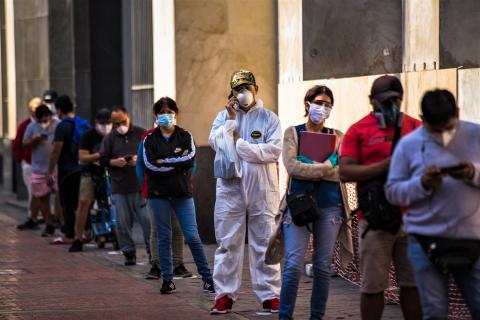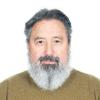A Few Reflections to Close the Year of COVID-19

“It was undoubtedly the feeling of exile—that sensation of a void within which never left us, that irrational longing to hark back to the past or else to speed up the march of time, and those keen shafts of memory that stung like fire.”
Albert Camus (1957 Nobel Prize Laureate for Literature). The Plague. Vintage, 1991.
As we approach the end of 2020, perhaps a few reflections are warranted on a period unlike any other in our global collective memory. While the ceaseless movement of time, manifested in the passing of days and months, is mostly an unconscious fact in our lives, only made visible by calendars, birthdays, and other celebrations, during this year it was different. The sameness of the days, with their now well-established routines, fears, frustrations, rebellions, and hopes, superseded our recent past by firmly imposing a very tangible present that continues to entrap us.
COVID-19 in the historical context of public health crises
Since the beginning of March, when the “Great Lockdown” gradually extended its tentacles across the world, as an initial response to the exponential spread of a novel coronavirus, SARS-CoV-2, few may have thought that come December we were going to still be ensconced as if in a state of siege. Indeed, this overwhelming reality has separated us from our loved ones, friends, and coworkers, and has imposed rigid norms that have forced us to alter and adapt our behaviors and routines to strict social distancing.
But paradoxical, our COVID-19 norms are not so different from the isolation and confinement measures followed in Europe to control infectious disease outbreaks in the Middle Ages. Or that beginning in 1519, were also used in parts of my native region, Latin America and the Caribbean, in accordance with the 1423 Venetian quarantine control system, to detain ships and isolate their crews and passengers outside harbors until sufficient time had elapsed without the outbreak of “pestilences.”
The onslaught of COVID-19 has been relentless worldwide, with a growing accumulated damage painfully measured as of today with close to 80 million infected people – and about 1.7 million premature deaths (not counting the excess mortality due to other conditions), and millions of people unemployed or underemployed that has resulted from the disintegration and slowdown of economic activity, trade, and the flow of people and capital across countries.
Exposing inequalities – and an opportunity for renewal
This catastrophe has exposed and brought to the fore with great clarity the manifestations and impact of glaring, pre-existing inequalities in our societies, where minorities and others at the bottom of the economic ladder, the frail and the sicker, have been hit hardest, while the well-off, although still at risk and working from home, have been able to resist better.
In our daily lives, like in a shipwreck, we have continued to hold on to memories of times past, as a way to recharge and remind ourselves that this too shall pass, and we can look forward to future times when we can hug and laugh with family and friends, work in close proximity to others, and travel and discover other geographies and people, without the fear that COVID-19 is waiting for us “just around the corner”. But, more importantly, I think, we are realizing and learning to accept that change is needed in our lives and in the existing social contracts of countries and between countries.
Rising to the challenge – and looking forward with solidarity
We, as a global collective, have resisted, mounted a strong response, and have seen the potential wonders that cooperation and solidarity can bring to enrich our arsenal against COVID-19. In an unprecedented historical feat, we have new vaccines produced in less than a year (good to keep in mind that the eradication of smallpox through a vaccine took several centuries, while the development of vaccines to deal with measles, influenza, and yellow fever, took several decades), as well as new diagnostics and treatment protocols that have reduced significantly the risk of severity and death among the infected.
These scientific leaps should amaze us: they have resulted from a mixture of accumulated knowledge and technologies, and the human capacity and capability to learn (an initial milestone was the publication of the genome sequence of the new virus on January 29, only weeks after the first case was notified), innovate, develop new knowledge, and translate that knowledge into applications to solve our needs. Also, we have come to realize that the adoption of basic public health measures such as wearing masks, washing hands, and social distancing, are once again helping us to keep the novel coronavirus virus at bay by preventing its uncontrolled spread as they have done over the centuries in similar outbreaks of infectious diseases.
During the past 10 months, we have been able to come together not only as a duty imposed by present challenges, but more importantly, we are realizing that the pandemic is offering us the opportunity to take stock and rebuild better our collective lives. As we enter the holiday season and gaze with hope into 2021, perhaps it will do us good to look back into history to learn that in the face of all types of past calamities – war, famine, and plagues – the resilient human spirit has triumphed when acting as a collective and not as isolated individuals and countries.
Going forward, particularly in the face of the momentous task of having to vaccinate entire populations in the new year, without leaving the most vulnerable and poor behind as our moral obligation, we could start planting the seeds of a better world that is rooted in cooperation, solidarity, and respect for others, accepting our differences as a source of strength and not of conflict, and trying every day to be there as men and women for others, giving our best effort for the betterment of all.
Indeed, together, as the gospel song goes, “We shall overcome, We shall overcome, We shall overcome, some day!”
Photo: Long, socially-distanced lines to access services in Lima, Peru. © Victor Idrogo / World Bank
The original version of this blog was posted at the World Bank Group Investing in Health site on December 23, 2020:
A few reflections to close the year of COVID-19 (worldbank.org)
